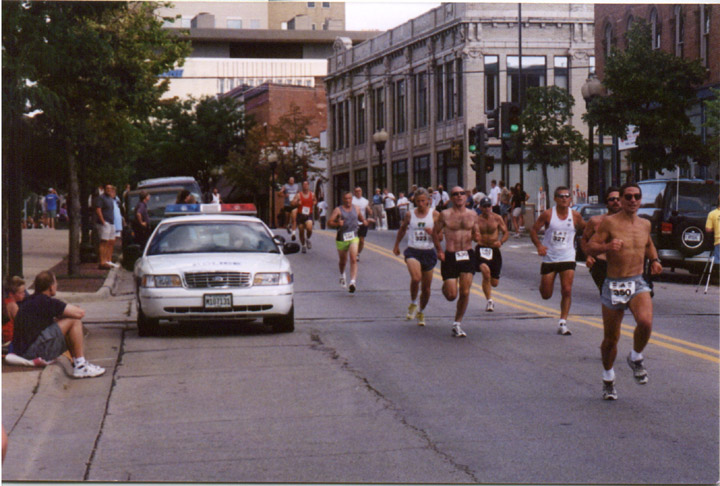
Runner, 60, takes setting record in stride.
Professor shatters state mark for mile in age group.
Chicago Tribune; Chicago, Ill.; Aug 24, 2001; John Flink Special to
the Tribune;
Abstract:
PHOTO; [Ed Packel] (center) running in the 2001 Rockford Mile.
Packel, who runs with the Lake Forest/Lake Bluff Running
Club in Lake Forest, played soccer in college and was urged
to try to break the mile record by a club member.
Full Text:
(Copyright 2001 by the Chicago Tribune)
When Lake Forest College math professor Ed Packel decided this year that he was going to break the Illinois record in his age group for running a mile, he thought he had a pretty good shot at it. The record for 60- to 64-year-old men was 5 minutes and 42 seconds, which, he said, looked "pretty soft."
Packel, who turned 60 in July, trained hard, doing lunges, running in the Lake Michigan surf and doing all manner of "`Chariots of Fire' stuff," he said. At the State Street Mile, a race in Rockford every August, Packel demolished the old record with a time of 5 minutes, 17 seconds. "It's a little unusual to break a mile record by so much, but it's understandable, because there aren't very many serious runners at my age," Packel said. "But I know of several people in my age group who might have been able to do it."
Times for the State Street Mile are certified by USA Track and Field of Illinois, a sanctioning organization. The group keeps records in 17 categories each for men and women, ranging from 0 to 8 years old to 70 to 74 years old. The record Packel broke has stood since 1999, when it was set by Helmut Rothe of Westmont in the State Street Mile.
A former college soccer player who said he always has been fascinated by running fast, Packel has been an avid member of the Lake Forest/Lake Bluff Running Club since he helped establish it in 1980. Club member Kevin Koy convinced Packel that he could break the record.
Koy, 42, was a runner in college and specialized in the mile. He coached Packel using the methods his coaches taught him, such as 5:30 a.m. runs on the beach.
"A lot of people continue to run marathons as they get older, but running a flat-out mile is very stressful on the body and it takes a lot longer to heal at 60 than it does at 20," Koy said. "I knew he had it in him to beat the record, maybe by as much as five seconds. Never in my wildest dreams did I think he would beat it so decisively. He shattered it."
Packel said he never has had a serious injury duringa lifetime of sports. At his age, he said, a single injury can derail hopes of record- breaking running, because the body won't bounce back completely anymore.
His wife of 21 years, Kathryn Dohrmann, 53, a psychology professor at Lake Forest College, attributes Packel's avoidance of injuries to outstanding physical conditioning, which she says he has maintained for a long time. "We've been running together for years," Dohrmann said. "But I run behind Ed. He's a lot faster."
When he's not running, Packel studies topics such as theoretical computer science, mathematical modeling, game theory, and social choice theory. His portfolio of publications includes a book titled "The Mathematics of Games and Gambling."
He has been a visiting professor at the California Institute of Technology, Columbia University, the University of California at Berkeley and at the University of Sydney, among other places.
"Running keeps me fit," Packel said. "I can eat pretty much whatever
I want. I've made a lot of friends through running. I'll keep doing it
as long as my body lets me. I'm really lucky."